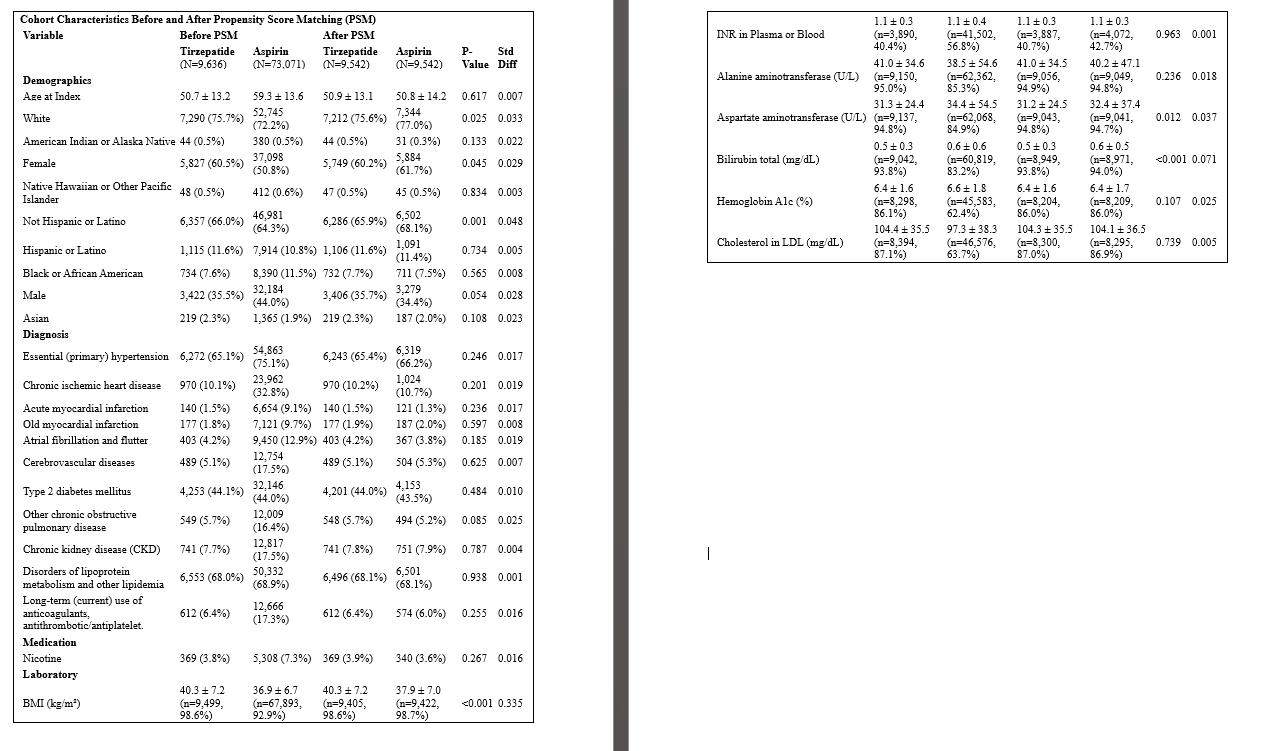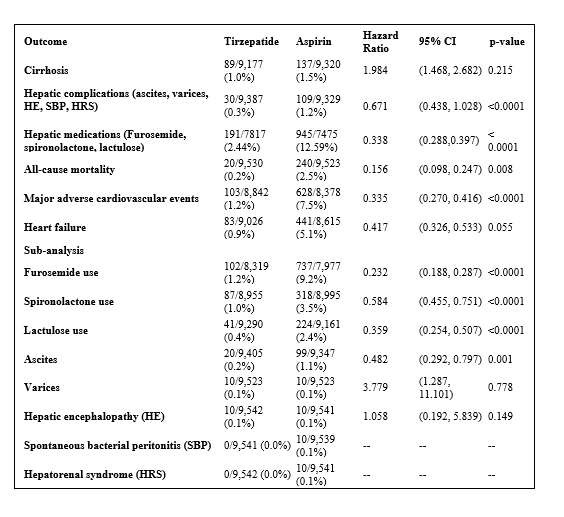Sunday Poster Session
Category: Diet, Nutrition, and Obesity
P0551 - Cardiovascular and Hepatic Outcomes of Tirzepatide vs Aspirin in Patients With Obesity and Metabolic Dysfunction-Associated Steatohepatitis: A Real-World Analysis
Sunday, October 26, 2025
3:30 PM - 7:00 PM PDT
Location: Exhibit Hall
- FM
Farirai Melania Marwizi, MD (she/her/hers)
Episcopal Health Services
Queens, NY
Presenting Author(s)
Farirai Melania Marwizi, MD1, Olanrewaju Adeniran, MD2, Abidemi Akinrinmade, MD3, Arthur CHIDI. Igbo, MD, MPH4, Budoor Alqinai, MBChB, MSc5, Emeka S. Obi, MBBS6
1Episcopal Health Services, Queens, NY; 2West Virginia University Morgantown, Morgantown, WV; 3University of Pittsburgh Medical Center- McKeesport, McKeesport, PA; 4Texas Health Resources HEB/Denton Internal Medicine Program, Lewisville, TX; 5West Virginia University, Morgantown, WV; 6One Brooklyn Health-Brookdale University Hospital Medical Center, Brooklyn, NY
Introduction: Several studies have shown the superior cardiovascular and hepatic benefits of tirzepatide
compared to other incretin-based medications for metabolic dysfunction-associated steatotic liver
disease (MASD) and metabolic dysfunction-associated steatohepatitis (MASH). Furthermore,
recent clinical trials indicate that a daily aspirin regimen can significantly lower liver fat content.
In the pursuit of a sustainable treatment for MASLD/MASH, this study examines the efficacy
and safety profiles of tirzepatide and aspirin on the progression of MASLD/MASH and its
related complications.
Methods: Using the Trinetx database, we identified patients with obesity (body mass index ≥30 kg/m²) and
MASLD and/or MASH from January 1, 2019, to December 31, 2023. Two cohorts were
examined: the tirzepatide group and the aspirin group. We included only participants who began
either medication after being diagnosed with MASLD or MASH. Patients on other GLP-1RAs
besides tirzepatide and those with other causes of liver disease were excluded. Propensity score
matching (PSM) was utilized to balance baseline characteristics (Table 1). Primary outcomes
include the risk of major adverse cardiovascular events (MACE), all-cause mortality, progression
to fibrosis, hepatic complications, and hepatic medication use.
Results: Before PSM, 9,636 and 73,071 patients were analyzed in the tirzepatide and aspirin groups,
respectively. After PSM, 9,542 patients were identified in both groups. Tirzepatide demonstrates
therapeutic advantages across multiple clinical domains, showing significant reductions in all-
cause mortality (0.2% vs. 2.5%) and major adverse cardiovascular events (MACE) (1.2% vs.
7.5%). Tirzepatide also exhibits a superior hepatic safety profile with less medication use (2.4%
vs. 12.5%) and fewer complications. Although not statistically significant, tirzepatide was also
associated with a reduced risk of progression to cirrhosis (1.0% vs. 1.5%) (p = 0.215) (Table 2).
Discussion: Our analysis revealed that tirzepatide provides significant benefits over aspirin for patients with
obesity and MASLD/MASH. While cirrhosis progression shows a non-significantly increased
risk, the overwhelming cardiovascular and survival benefits, along with superior prevention of
hepatic complications, are noteworthy. Additionally, the significant risk reductions across
primary endpoints suggest that tirzepatide offers substantial net clinical benefit in this high-risk
population.

Figure: Table 1

Figure: Table 2
Disclosures:
Farirai Melania Marwizi indicated no relevant financial relationships.
Olanrewaju Adeniran indicated no relevant financial relationships.
Abidemi Akinrinmade indicated no relevant financial relationships.
Arthur Igbo indicated no relevant financial relationships.
Budoor Alqinai indicated no relevant financial relationships.
Emeka Obi indicated no relevant financial relationships.
Farirai Melania Marwizi, MD1, Olanrewaju Adeniran, MD2, Abidemi Akinrinmade, MD3, Arthur CHIDI. Igbo, MD, MPH4, Budoor Alqinai, MBChB, MSc5, Emeka S. Obi, MBBS6. P0551 - Cardiovascular and Hepatic Outcomes of Tirzepatide vs Aspirin in Patients With Obesity and Metabolic Dysfunction-Associated Steatohepatitis: A Real-World Analysis, ACG 2025 Annual Scientific Meeting Abstracts. Phoenix, AZ: American College of Gastroenterology.
1Episcopal Health Services, Queens, NY; 2West Virginia University Morgantown, Morgantown, WV; 3University of Pittsburgh Medical Center- McKeesport, McKeesport, PA; 4Texas Health Resources HEB/Denton Internal Medicine Program, Lewisville, TX; 5West Virginia University, Morgantown, WV; 6One Brooklyn Health-Brookdale University Hospital Medical Center, Brooklyn, NY
Introduction: Several studies have shown the superior cardiovascular and hepatic benefits of tirzepatide
compared to other incretin-based medications for metabolic dysfunction-associated steatotic liver
disease (MASD) and metabolic dysfunction-associated steatohepatitis (MASH). Furthermore,
recent clinical trials indicate that a daily aspirin regimen can significantly lower liver fat content.
In the pursuit of a sustainable treatment for MASLD/MASH, this study examines the efficacy
and safety profiles of tirzepatide and aspirin on the progression of MASLD/MASH and its
related complications.
Methods: Using the Trinetx database, we identified patients with obesity (body mass index ≥30 kg/m²) and
MASLD and/or MASH from January 1, 2019, to December 31, 2023. Two cohorts were
examined: the tirzepatide group and the aspirin group. We included only participants who began
either medication after being diagnosed with MASLD or MASH. Patients on other GLP-1RAs
besides tirzepatide and those with other causes of liver disease were excluded. Propensity score
matching (PSM) was utilized to balance baseline characteristics (Table 1). Primary outcomes
include the risk of major adverse cardiovascular events (MACE), all-cause mortality, progression
to fibrosis, hepatic complications, and hepatic medication use.
Results: Before PSM, 9,636 and 73,071 patients were analyzed in the tirzepatide and aspirin groups,
respectively. After PSM, 9,542 patients were identified in both groups. Tirzepatide demonstrates
therapeutic advantages across multiple clinical domains, showing significant reductions in all-
cause mortality (0.2% vs. 2.5%) and major adverse cardiovascular events (MACE) (1.2% vs.
7.5%). Tirzepatide also exhibits a superior hepatic safety profile with less medication use (2.4%
vs. 12.5%) and fewer complications. Although not statistically significant, tirzepatide was also
associated with a reduced risk of progression to cirrhosis (1.0% vs. 1.5%) (p = 0.215) (Table 2).
Discussion: Our analysis revealed that tirzepatide provides significant benefits over aspirin for patients with
obesity and MASLD/MASH. While cirrhosis progression shows a non-significantly increased
risk, the overwhelming cardiovascular and survival benefits, along with superior prevention of
hepatic complications, are noteworthy. Additionally, the significant risk reductions across
primary endpoints suggest that tirzepatide offers substantial net clinical benefit in this high-risk
population.

Figure: Table 1

Figure: Table 2
Disclosures:
Farirai Melania Marwizi indicated no relevant financial relationships.
Olanrewaju Adeniran indicated no relevant financial relationships.
Abidemi Akinrinmade indicated no relevant financial relationships.
Arthur Igbo indicated no relevant financial relationships.
Budoor Alqinai indicated no relevant financial relationships.
Emeka Obi indicated no relevant financial relationships.
Farirai Melania Marwizi, MD1, Olanrewaju Adeniran, MD2, Abidemi Akinrinmade, MD3, Arthur CHIDI. Igbo, MD, MPH4, Budoor Alqinai, MBChB, MSc5, Emeka S. Obi, MBBS6. P0551 - Cardiovascular and Hepatic Outcomes of Tirzepatide vs Aspirin in Patients With Obesity and Metabolic Dysfunction-Associated Steatohepatitis: A Real-World Analysis, ACG 2025 Annual Scientific Meeting Abstracts. Phoenix, AZ: American College of Gastroenterology.
